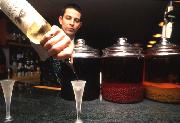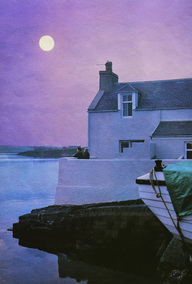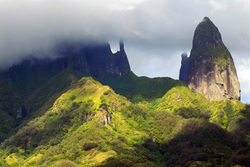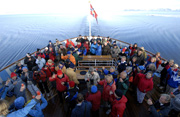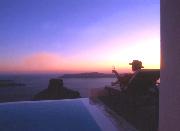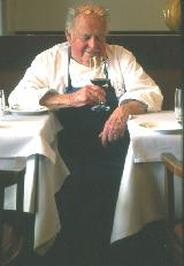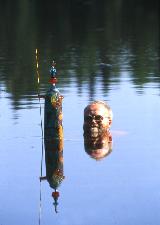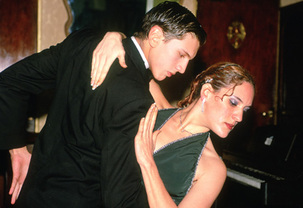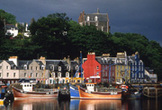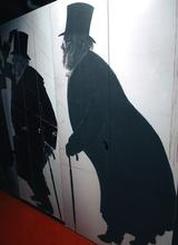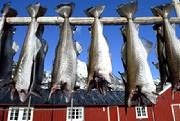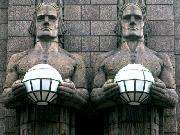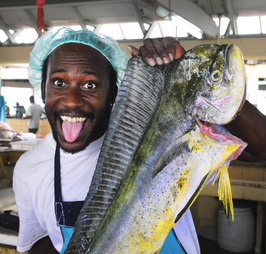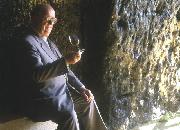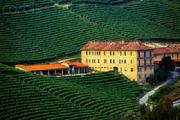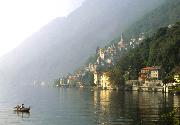|
Having failed to impart immortality, aquavit, or bränvin (burnt wine) as it was also called, was credited with wondrous curative powers. Spices were first added to make these early crude-tasting distilled spirits drinkable, and were later combined with herbs for greater medicinal potency. Aquavit was believed to cure a wide variety of ailments, ranging from warts to the plague. In fact, there was nothing it wouldn't cure, including alcoholism.
from "Skål! Swedes love their aquavit - Rituals and All." |
|
"To stop in the company with the rest at evening is enough. To be surrounded by beautiful, curious, breathing, laughing flesh is enough..." Walt Whitman's words come to mind as we tumble out into the long, mild twilight of the summer’s night. A hamlet asleep and all around the utter solitude of sea and sky. from "Orkney Islands" |
|
The skyline of Ua Pou rose dramatically out of the South Pacific - rocky shores and lush green hills, and, above them, brooding volcanic pinnacles, soaring into the sky, summits hiding behind rain-filled clouds. It was 6AM, and I was standing on the deck of the cruise freighter Aranui 3. After embarkation in Parapeete, Tahiti, we were already into Day 4 of a two-week cruise, and had traveled nearly a thousand miles to get to this point. The Marquesas Islands. This is the most northerly archipelago in French Polynesia, just south of the equator, and farther from a continental landfall than any other group of islands on earth - as far as you can get from so-called civilization. from "A Polynesian Odyssey: Voyage to the Marquesas Islands" |
|
Now, reflecting upon our Svalbard adventure cruise, I often come back to that night when we had just passed the 80th parallel. The soft sunlight, the afterdeck full of happy people, champagne corks popping, the high clean air - everything conspiring to make it the natural high point of a memorable experience. We had been to the top of the world!
from "NEXT STOP: NORTH POLE" |
In Vila, as in Bausen, you felt as if time had stood still. The narrow stone streets lay empty, basking in the afternoon sun. Then utter tranquility gave way to a bit of rural uproar. A hen crossed the street, followed by a rooster. A dog barked, a cat showed up in a window, and a woman of indeterminate age came out of a doorway, carrying a cooking pot.
from "Bossost and other Catalan Discoveries"
from "Bossost and other Catalan Discoveries"
|
Ours proved to be not just a room but a suite with a stunning view, which, in a startling visual juxtaposition, immediately brought back thoughts of the island's tumultuous past. Rising, seemingly from the edge of the shimmering turquoise water of our private swimming pool, was a steep, dark promontory, topped with a giant crag, so fractured that it looked as if it may tumble into the Caldera at any moment. This was Skaros, now uninhabited, but in medieval times the capital of Santorini, a thriving little Catholic settlement, where, from their inaccessible perch, Venetian nobles kept pirates at a safe distance.
from "Santorini" |
...we found ourselves in what was obviously a very active landscape, steam percolating in any number of places. The geyser that greeted us had now subsided. On the site was a circle of spectators, waiting for the next eruption. A few minutes passed. Tension rose. Then whoosh! Up it went, and everybody was happy. These eruptions occur regularly, but the timing is not that precise, leaving room for what Roxie called "the seductiveness of unpredictability." She was fascinated, and said she could have stayed there forever. But after a third eruption we pressed on - to the next natural phenomenon - the Gullfoss waterfall.
from "Icelandic Interlude"
from "Icelandic Interlude"
|
Wedholms Fisk is the creation of Bengt Wedholm, a much-loved figure, not only in chef circles but in all of Sweden. I had met Bengt on previous occasions and been struck by his crusty but generous personality, caustic wit, and uncompromising attitude in food matters. Now in his eighties and with a troublesome hip, he complains that he can no longer indulge in his one hobby: sailing. Fortunately, the condition doesn’t prevent him from showing up in the kitchen every morning.
For appetizer we had Salmon Tartar, a pile of bleak roe and finely cut, lightly marinated salmon, served with a touch of sour cream, ingredients so exquisitely molded in taste that my wife, sitting beside me, sighed with pleasure. As another bottle of Alsace wine arrived at the table, so did Grilled Turbot with Dijon Hollandaise, a house specialty - peerless and plentiful, as everything else in this place. from "Baltic Bounty" |
The Swedish miracle these days is cooking, not tennis. The racquet has been replaced with a whisk, Borg with Bocuse, and the arena of fierce competition among young Swedes has moved from the tennis courts into the restaurant kitchens. As a result, a showering of various cooking awards and Michelin stars has descended on the nation, especially its capital which, with a population of 1.5 million, now boasts more than 700 restaurants.
Crammed with beautifully preserved old buildings in a labyrinth of little squares, narrow streets, and even narrower alleys, Gamla Stan (the Old Town) is saturated with history - history going back to when Stockholm first became an urban settlement in the 13th century. Gamla Stan, like Swiss cheese, is riddled with cellars, many of which have been turned into restaurants or cafes.
from "Culinary Capital"
Crammed with beautifully preserved old buildings in a labyrinth of little squares, narrow streets, and even narrower alleys, Gamla Stan (the Old Town) is saturated with history - history going back to when Stockholm first became an urban settlement in the 13th century. Gamla Stan, like Swiss cheese, is riddled with cellars, many of which have been turned into restaurants or cafes.
from "Culinary Capital"
|
They seemed the perfect match - the quintessential male and female - he thoughtful and and measured and looking a little like Sean Connery; she intuitive, impulsive, with sometimes, an unexpected sharpness in her very blue eyes, reminding me of Kipling's observation that a woman's guess is more accurate than a man's certainty. Shortly before we parted I took one final picture of Kjell. He was up to his neck in water, standing in one of Småland's numerous little lakes, clasping the African warrior, spear included. Around us rose the all-embracing forest so nurturing, it would seem, to all kinds of creativity. from "Glass Quartet" |
|
Danced properly, tango should be as passionate yet as loveless as a one-night stand, wildly erotic from the waist down with legs and hips intertwining, but with a cool distance maintained from the waist up. There must be no eye contact, no smiling, no expression of joy. As the evening wore on, malbeck flowed freely and our hosts, Any and Mariano, made sure that we got all the tapas we could eat. Well after midnight, a man named Ivor called from Brazil, telling the owner of how much he missed not being at Bar Sur listening to the heartbreaking music of Argentina. So, while the owner held up the receiver, the guitarist went behind the bar and played yet another song of unrelenting sadness. from "Argentina Album" |
|
In Tobermory, steep cliffs rise behind the curve of buildings facing the bay. On top sits the Western Isles Hotel. Gray-stoned and sedate, it seems to frown at the prismatic gaiety below, where all the houses are painted in different colors. After all, this is Tobermory, Scotland, not Portofino, Italy! But, as you get closer, walking down High Street, studying shop windows and signs, any notion of not being in Scotland isquickly dispelled. Everything, from the distillery at one end to the ferry landing at the other, exudes nothing but pure unadulterated Scottishness. There was the Tackle and Book Store for the dedicated angler and, next to it, a window with hundreds of mini-bottles with different brands of whisky - the perfect testing ground for the single malt aficionado. Next door, a hand-written sign dealt in its own fashion with the outside resistance to the most Scottish of all food products: ISLE-OF-MULL HAGGIS POSTAL SERVICE Why not send one to an enemy in the South? 3.60 pounds each. from "Rhum and Mull, Scotland" |
|
He was a man of strict habits.
Twice every day for ten years, he set out for the Grand Hotel's Reading Room, first at 11:30AM, then at 5:30PM. He would arrive at the stroke of 12 noon and 6PM respectively, and stay exactly an hour and a half each time. He was quite a fixture on the Oslo scene, and, as he invariably to the same route down Drammensveijen, passing the Royal Palace and continuing down the capital's main drag, Karl-Johan Street, everybody recognized him. There could be no mistaking those bushy whte whiskers, or the squat 5-foot frame - gaining stature from shoes with lifts and from a stovetop hat. from "Norway's Cultural Trio." |
The American Orient Express clanked, groaned, and moaned indignantly as it pulled out of the Chihuahua train station in northern Mexico. Being compelled to use rails meant for transport of goods rather than people was clearly an affront to a train of such refinement and elevated status. But as far as we passengers were concerned, it added to a sense of high adventure. Ahead lay a week-long, deluxe rail vacation in spectacular Copper Canyon - deeper and more expansive than the Grand Canyon. Before this 950-mile journey was over, we will have climbed to over 8,000 feet, rumbled across 39 trestles, and burrowed through 86 tunnels. At the end, there will be a swing to the north and a day spent at some fabulous beach resort on the Gulf of California.
from "The Copper Canyon Train Ride"
|
Outstanding scenery, of course, was one reason for coming here in the first plac. Another was, of all things, cod. Having read Mark Kurlansky's highly acclaimed book on the subject, I had been reminded not only of the multiple ways in which cod has been the "fish that changed the world," but of Lofoten as the world's cod capital par excellence. It was cod that brought human beings to these remote islands some 6,000 years ago, and it is cod - apart from tourists - that still keep them going.
from "In Cod We Trust." |
|
Granite-jawed, grim, and mythic - isometric and towering, the two lantern keepers guarding the main entrance of the rail road station in Helsinki are hard to miss. They have stood there since 1914, managing to look Egyptian, Teutonic, and Finnish, all at the same time. Legend has it that the sculptor, Emil Wikström, used his muscular gardener for a model. As a member of a Lutheran sect called the Pietists, the gardener wore his hair long, as do these giants.
from "Sculptures on my mind" |
In 1721 the wars between Sweden and Russia were finally put to and end. After a rosy beginning, with the 18-year old King Charles XII beating the Russians in early battles, the situation had taken a bad turn, and ended in disaster as the king was hauled into exile and later assasinated. This meant the end of Swedish supremacy in northern Europe. But peace was then so longed for that, when a new tavern opened on Österlånggatan, the most beautiful name that could be imagined was Den Gyldene Freden - the Golden Peace.
from "Gamla Stan, Sweden's Cultural Capital."
from "Gamla Stan, Sweden's Cultural Capital."
|
In Barbados, little yellow buses shuttle back and forth, providing cheap, exciting transport. The stops are all named for women: Paula, Debbie, Sabrina, and, on a more exotic note, Ronella, Esme,and Jasmine. Often filled to the last seat, they are driven at breakneck speed to the accompaniment of of ear-shattering music. One morning, Caribbean rhythms still ringing in our ears, we alighted from one of these buses at the outskirts of Bridgetown, ready for a peek at the local fishmarket. We were not disappointed. What energy, what color! Mammoth mahi mahis were held up for our inspection, as were tiny flying fish, looking less appetizing than they had on a sandwich. from "A slice of the West Indies" |
|
For ultimate dispatch the train company had planned an underground tunnel through Vouvray, where vibrations might damage precious grapes. This, of course, was intolerable to Monsieur Gaston Huet and his wine-making friends. They had protested vehemently and, as a result, the rails were to be rerouted three miles south of all major vineyards and padded with rubber cushions.
from "Loire Revisited" |
|
Speaking of French priorities, come Saturday morning, in every little town there's the outdoor market, a flurry of activity that ends abruptly at twelve noon, when everybody takes off for two hours. Stands are casually left untended. Why worry? Everyone is having lunch, including thieves. Few things could be more pleasurable than traveling around in the various European wine regions during harvest time. Apart from wine tastings and great food, they uniformly offer some of the prettiest scenery imaginable. Everywhere is the neat, pleasing geometry of rows upon rows of painstakingly tended plants. Sometimes, as in the Bordeaux area, the landscape is relatively flat (large estates, punctuated by magnificent chateaux); in Piedmont, Alto Adige, Tuscany, Burgundy, and the Loire Valley, it gently slopes; in Alsace and the Rhone Valley the land tends to get a lot more vertical, even quite dramatic. In Alsace, I once visited a vineyard too steep for tractors. It had to be worked by horses. from "Vineyard Views" |
|
This lake, of which Stendahl wrote "...one pities anyone who’s not madly in love with it," even inspired the invention of photography. It seems that the English scientist William Henry Talbot, before he and Louis Daguerre got together and worked it out, visited Lake Como. As he reflected upon the "inimitable beauty," before him, he thought "how charming it would be if it were possible to cause these natural images to imprint themselves durably, and remain fixed upon the paper."
from "Lake Como" |
